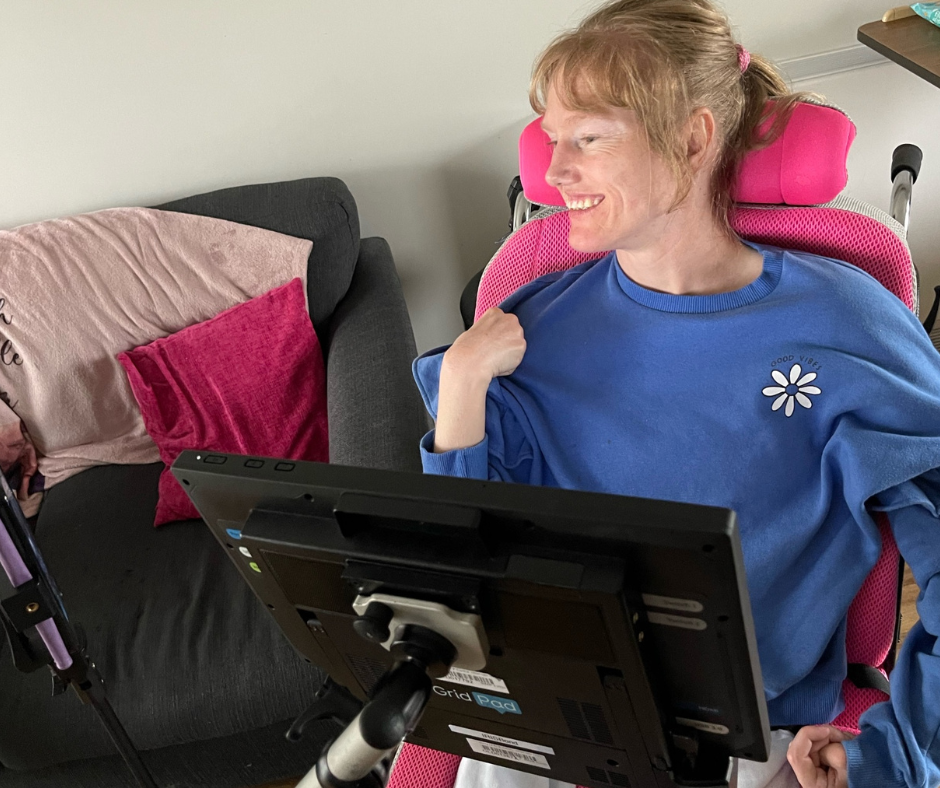Overview
In April 2021 AFG were awarded the support package for Sarah, a woman with a diagnosis of cerebral palsy, learning disability and dysphagia. She is also non-verbal.
Sarah had been supported by four providers previously, with each of these support packages breaking down. This resulted in her struggling with her mental and physical wellbeing, and displaying behaviours that challenge others due to her frustration and anxiety.
Our approach
Building trust
Following the repeated breakdowns of previous support, it was essential for Sarah’s support team to build a trusting relationship with her and her family. Her team were chosen carefully by skills matching them to Sarah’s needs and they worked in close partnership with her multi-disciplinary team to ensure her positive behaviour support plans were followed.
The team quickly recognised that consistency is extremely important to Sarah, so began showing her photos of who would be supporting her each day to ensure she was aware of what to expect, which reduced her anxiety and behaviours that challenge others.
They worked with her to understand her communication methods, signals and tools, which included eye gaze technology and picture cards. As Sarah settled into her home and built up a good relationship with the team, she was able to communicate what she wanted and the team understand her needs.
Support with diet
Sarah was initially severely underweight and required meal supplements and support from her SALT team to monitor her weight and diet. As her trust, confidence and communication with her support team improved, she was able to tell them exactly what she wanted for her meals and she gained weight due to eating a healthy, balanced diet. This resulted in her no longer needing meal supplements and being discharged from her SALT team.
Support with communication
When Sarah had been with a previous provider, she was referred for an assessment for an advanced communication tool which was available from an organisation called the ACE centre. This tool would allow her to communicate with full sentences rather than being limited to ‘yes’ or ‘no’ answers. To be eligible, Sarah needed to pass a four-hour assessment to demonstrate that she would be able to communicate using the tool. She unfortunately failed the assessment due to becoming too fatigued.
Sarah’s support team worked closely with her SALT team to build her concentration levels and prepare for her next assessment, and it was this joined up approach and perseverance that led to her passing the assessment and being offered the tool, which has completely transformed her life.
Using their knowledge of Sarah, her team have added personalised options to the device, including what she likes to eat and her favourite activities, meaning she can now have meaningful conversations. She communicates effectively with her support team and family and expresses her personality, for example by making jokes – when she asked for one of the team to do something for her while they were busy, she used the tool to say: “Am I talking to myself?”
Outcomes
Use of advanced communication tool
Sarah and her team use an advanced communication tool, which she had not passed the assessment for previously, and is now able to express her personality and communicate effectively.
Discharged from Speech and Language Therapy Support
Sarah had previously been underweight, on meal supplements and required ongoing support from her SALT team. She has now been discharged from the team, has gained weight and eats a healthy and balanced diet.
Enjoys regular activities, events and hobbies
Sarah is supported to attend a range of activities in the community, including discos, boxing, and hydrotherapy swimming.
Measurable improvement in mood
A year into her support with AFG, Sarah and her SALT team attended a review meeting where she was asked to provide a score on how she was feeling. In the previous meeting she had scored the lowest possible mark for her mental and physical health. In this meeting she scored the highest mark, demonstrating the huge impact the team have had on her wellbeing and quality of life.
Testimonial
Sarah’s mum, Margaret, talks about what this has meant for Sarah and their family.
